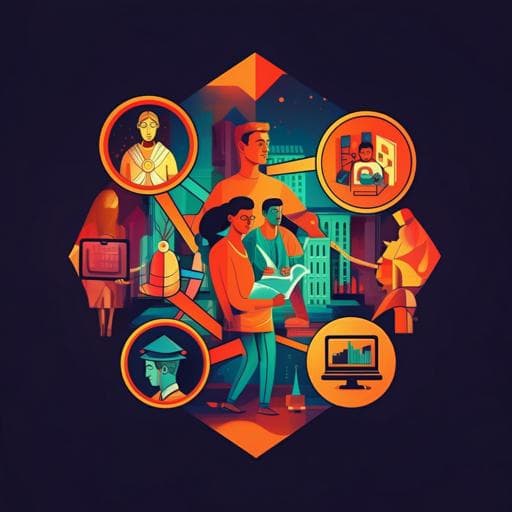
Education
Inclusive education of refugee students with disabilities in higher education: a comparative case study
M. Al-hendawi and A. M. Alodat
The paper situates the study within the global refugee crisis, noting more than 100 million displaced persons by 2022 and the profound educational disruption that accompanies protracted displacement. Higher education is highlighted as a pathway to social mobility and integration, yet refugees face substantial barriers, including stigma, discriminatory policies, and institutional constraints. For refugees with disabilities, barriers are compounded by intersectional challenges such as environmental inaccessibility and policy exclusion. Despite international frameworks like SDG-4 and the Convention on the Rights of Persons with Disabilities (Article 24) mandating inclusive education, a gap persists between normative ideals and implementation in host contexts. Prolonged displacement requires long-term, holistic strategies that include language support, recognized certification, integrated services, teacher training, trauma-informed supports, and flexible systems that can serve students with disabilities. Against this backdrop, the study aims to examine the intersecting challenges faced by Syrian refugee students with disabilities (RSwDs) in higher education in Jordan and Qatar, and to assess how institutional policies align with inclusive principles using the 4-A framework (availability, accessibility, acceptability, adaptability).
The literature underscores that access to higher education for refugees is extremely limited (about 1% globally), with even lower rates for those with disabilities due to intersecting barriers of refugee status and impairment. Prior studies document multilayered constraints including nationality, socioeconomic hardship, trauma, and inaccessible environments. Inclusive education is framed as a human right supported by international instruments, and the 4-A framework offers a model to evaluate policy obligations. In the Syrian context, over six million people have been displaced since 2011, with an estimated ~20% of refugees in Jordan and Lebanon having disabilities. Reported obstacles include lack of accessibility, financial resources, inclusive education, vocational training, and psychosocial programs. In Jordan, although higher education enrollment among nationals exceeds 30%, only about 8% of Syrian refugees access tertiary education. In neighboring host countries, rates are similarly low (e.g., Lebanon ~6%, Turkey ~1%). Arab states lack a unified special education policy, resulting in diverse practices from segregation to varying inclusion; the growing presence of refugees with disabilities necessitates institutional inclusion plans and transitional services. Prior analyses have largely treated refugee status and disability separately, leaving an evidence and policy gap at their intersection in higher education. The 4-A framework has been applied internationally to assess inclusion policies, and its extension to higher education is relevant given the rise in refugee participation at this level.
The study used a qualitative mixed-methods comparative case design across macro, meso, and micro levels. Micro-level: two in-depth, semi-structured interviews were conducted with Syrian students with disabilities enrolled at Yarmouk University (Jordan) and Qatar University (Qatar). The participants were purposefully selected for maximum variation: Sana (3rd-year, visual impairment, high-income background, QU) and Mohammad (4th-year, physical disability, low-income background, YU). Interviews (one telephone, one face-to-face) lasted 93 and 134 minutes, respectively, were conducted in Arabic, transcribed into 75 pages, translated into English, and member-checked. Inductive thematic analysis was performed: independent coding, consensus building, categorization, and theme generation. Meso-level: a literature review contextualized the cases within inclusive education research. Macro-level: a document/content analysis of institutional policies at YU and QU was conducted, focusing on disability-related units, admissions, strategic plans, and policy portals. A coding scheme, grounded in the 4-A framework (availability, accessibility, acceptability, adaptability), guided policy analysis with consensus coding and adjudication where needed. Trustworthiness was enhanced through triangulation (interviews and policy data), member checking, reflexive journaling and bracketing, an audit trail of procedures, and thick description. Researcher roles: Author 1 led participant recruitment, interviews, and transcript analysis; Author 2 led policy collection and analysis; both co-developed the coding scheme, interpreted findings, and integrated datasets.
Interviews yielded three major themes with subthemes: (1) Equity in higher education—residency status, admissions, and financial resources; (2) Services—accessibility and support services; (3) Challenges—administrative obstacles and future careers. Residency and legal status shaped experiences: Mohammad (refugee in Jordan, relocated from Zaatari camp) navigated extensive documentation; Sana (Qatar, temporary residency tied to parent’s employment) avoided refugee-specific procedures. Admissions were comparable to nationals with no special provisions for refugee status or disability. Financial resources were pivotal: Mohammad delayed entry by one year due to costs and relied on a European grant, without access to national disability tuition discounts reserved for citizens; Sana reported high tuition costs at QU but family capacity to cover them, with limited need to seek scholarships. Accessibility experiences diverged by disability type and institution. Sana required enlarged fonts and benefited from QU services; she reported independence in mobility. Mohammad, a wheelchair user, cited broken or small elevators and lack of ramps at YU, complicating campus navigation; he did not seek exam time extensions or curricular reductions. Support services: YU offered psychosocial services through a refugee center, which Mohammad found helpful; QU had general counseling and disability support but no refugee-specific services, which Sana had not used. Administrative obstacles included course registration issues that required in-person procedures, burdensome grant paperwork, and difficulties stemming from mobility and communication constraints. Future careers were a concern for both students, with uncertainty amplified by refugee and disability status; both universities lacked clear career services tailored to RSwDs. Policy analysis (15 codes across 4-A) showed: Availability—both institutions had disability service units/centers; YU also had a Refugees, Displaced Persons, and Forced Migration Studies Center and psychosocial services for refugees; neither had special admission regulations for refugees with disabilities, dedicated assessment procedures, or independent advocacy units. Accessibility—both provided academic accommodations and assistive technologies; QU explicitly mandated accessible physical environments, whereas YU policies did not codify physical accessibility requirements. Acceptability—both supported academic and social participation in policy. Adaptability—QU explicitly adopted UDL principles and offered a broad suite of financial aid options (monthly aid, tuition support, transport and housing fee exemptions, emergency aid) and employment support programs; YU lacked codified UDL, relied on external donors for refugee scholarships, and had no specified postgraduation employment programs. Overall, there was a marked gap between policy rhetoric and students’ lived experiences, particularly in financial support, physical accessibility (YU), targeted refugee services (both), and career planning (both).
The study addressed two questions: the experiences of Syrian RSwDs at YU and QU and the extent of alignment between institutional policies and inclusive education principles. Findings reveal a persistent gap between inclusive policy commitments and day-to-day realities. Intersectionality magnifies barriers—legal residency constraints, financial precarity, environmental inaccessibility, and administrative complexity combine to constrain equitable participation. While both universities espouse inclusion and provide accommodations and assistive technology, critical differences emerged: QU’s stronger resource base facilitated explicit physical accessibility, UDL adoption, and diverse financial aid; YU’s policies did not codify physical accessibility and lacked adaptability measures, leaving refugee students to depend on external scholarships. Despite QU’s relatively mature framework, neither university specified refugee-targeted supports or career services for RSwDs, and students remained apprehensive about employment prospects. The results underscore that inclusive higher education requires not only formal commitments but also robust, context-sensitive implementation that addresses refugee legal status, sustained financial aid, physical accessibility audits and upgrades, and tailored administrative and career support. Integrating rights-based frameworks like the 4-A with universal design principles can enhance systemic responsiveness, but without explicit attention to the refugee–disability nexus, many students will remain excluded from full participation.
This comparative case study contributes evidence on how the intersection of refugee status and disability shapes access to and experiences within higher education in Arab contexts. It highlights a divergence between inclusive policy language and practice, particularly around financial aid, accessible infrastructure, targeted refugee supports, and career preparation. Recommendations include: expanding need-based scholarships and grants for RSwDs; streamlining refugee and disability verification processes through centralized, accessible systems; conducting accessibility audits and upgrading infrastructure and transport; providing individualized academic accommodations and assistive technology by disability type; and establishing dedicated, legally informed career counseling and mentoring for RSwDs. Socioemotional supports and peer networks should be strengthened to address trauma and foster belonging. Future research should longitudinally track access, accommodations, and outcomes for RSwDs; examine faculty preparedness and attitudes; and assess how rights-based inclusion approaches build social capital and leadership among refugee students with disabilities.
The study’s transferability is limited by its small sample (two participants) and the specific institutional and national contexts. Policy analysis relied on university website documents and did not comprehensively integrate national legislative frameworks, introducing possible reporting bias. Thematic analysis may reflect researcher influence despite reflexive controls and peer debriefing. Differences in interview modality (phone vs. face-to-face) could have affected disclosure comfort. The sample lacked diversity across age, gender, and academic programs, further limiting generalization; broader, multi-site studies are warranted.
Related Publications
Explore these studies to deepen your understanding of the subject.







